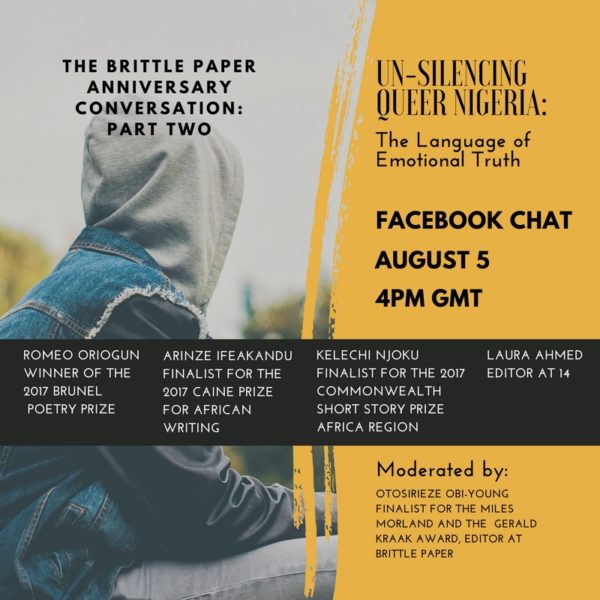
On August 1, 2017, Brittle Paper will be seven years old. To mark our anniversary, we are organising a series of events, among which are Facebook conversations with writers, editors and founders of literary initiatives. This is the second of our anniversary conversations.
*
For decades, queer Nigerians—lesbians, gays, bisexual, transgender, transsexual—have been nearly absent in Nigerian literature. Their absence suggested something untruthful: that they did not exist. In the handful of fiction in which their existence was acknowledged, it was merely as a plot device, a strategy to make political points about rebellion and difference. A harsh focus that perhaps derived from, and allowed itself become another basis for, the fallacy that queerness is un-African.
Until the late 1990s when Unoma Azuah began writing. Until 2005 when Jude Dibia’s Walking with Shadows was published. Centering on the queer experience, Dibia’s fiction was an unanticipated announcement: queer people exist and would no longer be silent. His work provided an important foundation for the writing that emerged in the 2010s, writing that challenged stereotypes about queerness. In 2011, Unoma Azuah’s novel, Edible Bones, was published and won the Aidoo-Snyder Book Award. In 2013, Chinelo Okparanta’s short story collection, Happiness, Like Water, was published and won the LAMBDA Literary Award for Lesbian Fiction; one of its stories, “America,” was shortlisted for the Caine Prize for African Writing, becoming the first Nigerian short story about queerness to attain wide readership.
In 2014, then president, Goodluck Jonathan, signed into law a bill that recommended 14 years’ imprisonment for homosexuals. In 2015, Chinelo Okparanta’s Under the Udala Trees arrived, a novel that, for the first time, told the story of the Biafran War and its aftermath from a queer person’s point of view; it won the LAMBDA Award for Lesbian Fiction and was shortlisted for the International Dublin Literary Award. In 2016, Unoma Azuah edited Blessed Body: The Secret Lives of LGBT Nigerian Lesbian, Gay, Bisexual and Transgender, a collection of the real-life experiences of queer people. In June 2016, Joe Okonkwo’s Jazz Moon was published; it was a finalist for the LAMBDA Literary Award for Gay Fiction. In July 2016, Pwaangulongii Dauod’s Granta essay, “Africa’s Future Has No Space for Stupid Black Men,” went viral. In December 2016, the Gerald Kraak Award, a prize recognizing writing and visual art that center on the queer experience, social justice and gender, shortlisted works by four Nigerians—Amatesiro Dore’s “For Men Who Care,” Ayo Sogunro’s “One More Nation Bound in Freedom,” Olakunle Ologunro’s “The Conversation,” and Otosirieze Obi-Young’s “You Sing of a Longing.”
In January 2017, Nigeria’s first LGBTI literary collective, 14—which took its name from the jail term prescribed by the anti-gay law—released an anthology of writing and visual art, We Are Flowers, which drew international attention. In May 2017, the Brunel International African Poetry Prize went to Romeo Oriogun for his “beautiful and passionate writing on masculinity and desire in the face of LGBT criminalisation and persecution.” The same month, Chibuihe Obi’s Brittle Paper essay, “We’re Queer, We’re Here,” was widely read. In June 2017, the Caine Prize for African Writing shortlisted Arinze Ifeakandu’s “God’s Children Are Little Broken Things.”
That the last two years have witnessed this unprecedented diversification of the Nigerian literary space, that things have reached this point when people can write at all about queerness, is a small but seminal victory not taken for granted. However, the ones who have written about the queer experience have not gone unpunished by Nigerian homophobia. In 2016, one had to flee his city for his life. In May 2017, another was intensely assaulted. In June 2017, a third was kidnapped and physically abused.
In the wake of these horrific past two months in which Nigerian homophobia has expended law-backed violence on writers, Brittle Paper brings together a few of the country’s notable new voices to discuss the future of queer writing in Nigerian literature. For the conversation titled “Un-Silencing Queer Nigeria: The Language of Emotional Truth,” our guests are: Romeo Oriogun, winner of the 2017 Brunel International African Poetry Prize; Arinze Ifeakandu, finalist for the 2017 Caine Prize for African Writing; Kelechi Njoku, finalist for the 2017 Commonwealth Short Story Prize for Africa Region; and Laura Ahmed, editor at 14. We take special delight in hosting this all-important conversation. All of these new voices were published by us long before they began their ascent: their invitation is based on their representation of Brittle Paper‘s vision to be a space for the growth of young and emerging voices on the continent.
We invite the literary community to be part of this.
TOPIC:
Un-Silencing Queer Nigeria: The Language of Emotional Truth
GUESTS:
Romeo Oriogun, winner of the 2017 Brunel International African Poetry Prize.
Arinze Ifeakandu, finalist for the 2017 Caine Prize for African Writing.
Kelechi Njoku, finalist for the 2017 Commonwealth Short Story Prize for Africa Region.
Laura Ahmed, editor at 14.
MODERATOR:
Otosirieze Obi-Young, finalist for the 2016 Miles Morland Writing Scholarship and the 2017 Gerald Kraak Award, editor at Brittle Paper.
DATE:
August 5.
TIME:
4 p.m. GMT.
VENUE:
Brittle Paper’s Facebook page.









COMMENTS -
Reader Interactions